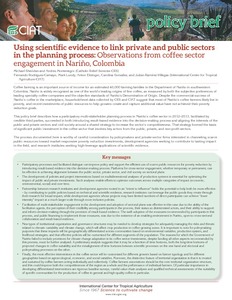Using scientific evidence to link private and public sectors in the planning process: observations from coffee sector engagement in Nariño, Colombia.
Coffee farming is an important source of income for an estimated 40,000 farming families in the Department of Nariño in southwestern Colombia. Nariño is widely recognized as one of the world’s leading origins of fine coffee, as measured by both the subjective preferences of leading specialty coffee companies and the objective standards of Nariño’s Denomination of Origin. Despite the commercial success of Nariño’s coffee in the marketplace, household-level data collected by CRS and CIAT suggest that most of Nariño’s coffee farmers likely live in poverty, and recent investments of public resources to help growers create and capture additional value have not achieved their poverty reduction goals.
This policy brief describes how a participatory multi-stakeholder planning process in Nariño’s coffee sector in 2012–2013, facilitated by credible third parties, succeeded in both introducing result-based evidence into the decision-making process and aligning the interests of the public and private sectors and civil society around a shared strategy to increase the sector’s competitiveness. That strategy formed the basis of significant public investment in the coffee sector that involves key actors from the public, private, and non-profit sectors.
The process documented here is worthy of careful consideration by policymakers and private-sector firms interested in channeling scarce public resources toward market-responsive poverty reduction investments, development agencies seeking to contribute to lasting impact in the field, and research institutes seeking high-leverage applications of scientific evidence.

